牛津模块六grammar and usage
牛津英语模块六第二单元Grammarandusage精品教案1

Grammar and usageStep 1: General introduction and explanation to past and future tensePast tenseI. The simple past tense:It is often used to talk about something that happened in the past and is now finished.e.g. She worked late into night yesterday.II. The past continuous tense:The tense is to talk about something that happened in the past and continued for some time.e.g. She knew that as a famous dancer she was making her parents proud in those years.III. The past perfect tense:1. The past perfect tense is often used with the simple past tense. If one action happens before another in the past, the past perfect tense is used.e.g. Upon entering the tomb, Carter’s lucky pet bird , which had led him to the place, was eaten bya snake.2. The past perfect tense is sometimes used in reported speeche.g. “We emptied the tomb of everything it contained,” said Carter.Carter said that they had emptied the tomb of everything it contained.3. The use of the past perfect tense simply indicates that an action comes before another past action, used with time expressions such as when, after, before, as soon as, until, by, for and alreadye.g. I had done my homework this morning before I went to the museum.Future tenseI. The form and usage of the simple future tense:1. will/shall do:表示将来发生的动作或出现的状态,shall仅与第一人称连用2. be going to do:表示主语计划打算的行动或看来就要发生的事情3. be doing:表示计划或安排好的动作(go, come, leave, begin 等动词)4. be to do:表示客观上计划或安排好的动作5. be about to do:表示即将发生的动作,一般不带时间副词或短语6. do:表示与安排,计划或时刻表有关的动作;或用于if, when等状语从句中代替will do. II. The usage of the future continuous tense:1. Talk about something that will be in progress at a certain time or over a period of time in the future. (讨论将来某个时间点或时间段正在进行的动作)e.g. Toby will not be in London next Tuesday. He will be climbing in the Himalayas.Toby will be climbing in the Himalayas all next week.1.Express future without intention. When it is used in this way, we want to indicate thatsomething will happen naturally. It doesn’t imply that the speaker has arranged the action.(表示不包含说话者主观意愿的纯粹将来。
牛津高中英语模块六Grammar and usage 伶伶

不定式用在介词but,except,besides 后时如果这些介词前有行为动词do的 各种形式,那么介词后的不定式不带 to,相反则带to。e.g. (1) She could do nothing but cry. (2) I have no choice but to go. (3) What do you like to do besides sleep.
☆动名词作定语 1.-ing 形式和所修饰的名词在逻辑上有主谓 关系,表示这个名词(人或物)的动作或状态, 相当于一个定语从句。 The man performing on the stage is a famous comedian. =The man who is performing on the stage is a _______________ famous comedian. 正在舞台上表演的那个人是个著名的喜剧演 员。
不定式可以和when / where /how / When and where to go hiking what / whether等连用,在句中作 is not decided yet 主语、宾语和表语,而动名词则不能
高考链接: _______ is a good form of exercise for both young and old. A.The walk B. Walking C. To walk D. Walk
完成同步 练习3
☆现在名词作宾补(见学案P15-16)
V3 + sb. + doing sth.
e.g. At that time, I found him crying in the street. 那时,我发现他在街上哭。 He was caught smoking in the washroom. 他在洗手间里吸烟被发现了。 The missing boys were last seen playing near the river. 那个失踪的男孩最后被人看见时在河边玩。
高二英语 模块六 M6U4Grammar and usage课件 牛津版
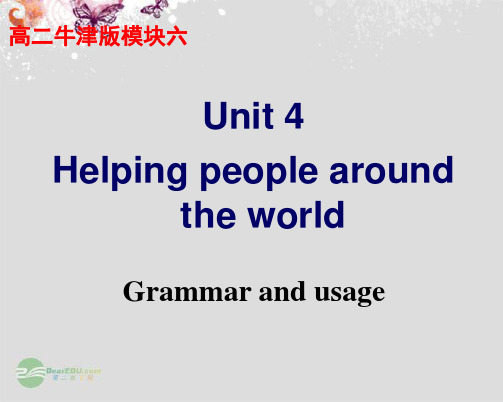
I could have caught the bus. (but I didn’t) You’ve make a few spelling mistakes, you might have been more careful. (but you were careless)
注意:
情态动词+have done有时表 示对过去动作或状态的推测(其中 情态动词无时态之分)。 例如: Can he have stayed at a friend’s last night? They may have arrived by now.
2. With (if I had) more money, I could help more people in need.
3. But for the (if there was no) money you sent me, I would starve now.
4. I am too hungry, or/otherwise I would not try to eat you. (=If I were not so hungry, I would not try to eat you.)
高二牛津版模块六
Unit 4 Helping people around the world
Grammar and usage
Revision: If 虚拟语气
件从 If 从句中的 主句中的谓语形式 句条 谓语形式 would/could/should 过去时 现在 (did/were) /might +V.(原) would/could/should/ 过去 过去完成时 might + have + p.p. 1. 过去时 would/could/should 将来 2. should+V. /might +V.(原) 3. were to do
Book6_U1教案4Grammarandusage

牛津高中英语教学设计教材:牛津高中英语(模块六)高二上学期文档内容:教学设计—教案单元:Unit 1 Laughter is good for you板块:Grammar作者:刘青Thoughts on the design:本节课是一节语法复习课。
因为非谓语动词学生都已经学过,本堂课主要由教师引导学生回顾非谓语动词作主语、定语和宾语补足语的用法和含义,再配以相应的练习和活动确保学生对非谓语动词这几项功能的掌握和正确运用。
Teaching aims:After this class, the students will be able to1. tell the differences between “to do” and “doing”;2.express their opinions using the verb forms;e non-finite in exercises correctly.Teaching procedures:Step 1 lead in (PPT4-5)Give the students a sentence “Laughter is good for our health. So l love comedies. With everything prepared, I will perform in the comedy to be put on this weekend. Acting in a drama will be an unforgettable experience. ” and ask “What are the functions of the parts in red?”They are: object complement, attributive and subject.What is the grammatical term for the three verb forms? —non-finite[Explanation]因为学生在模块五刚系统地学习了非谓语动词的含义和用法,对此还比较熟悉,直接用语境让他们识别,自然的引出现在非谓语动词的几个形式。
牛津英语模块六第四单元GrammarandUsage精品教案1
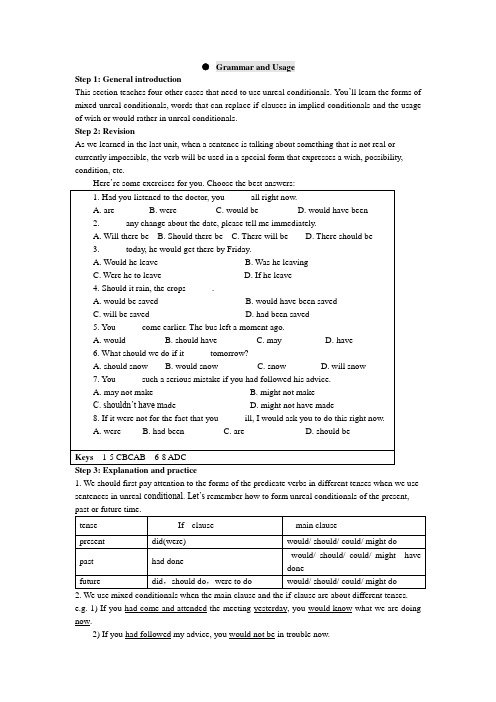
●Grammar and UsageStep 1: General introductionThis section teaches four other cases that need to use unreal conditionals. You’ll learn the forms of mixed unreal conditionals, words that can replace if-clauses in implied conditionals and the usage of wish or would rather in unreal conditionals.Step 2: RevisionAs we learned in the last unit, when a sentence is talking about something that is not real or currently impossible, the verb will be used in a special form that expresses a wish, possibility, condition, etc.Step 3: Explanation and practice1. We should first pay attention to the forms of the predicate verbs in different tenses when we use sentences in unreal conditional. Let’s remember how to form unreal conditionals of the present,e.g. 1) If you had come and attended the meeting yesterday, you would know what we are doing now.2) If you had followed my advice, you would not be in trouble now.Now, complete Part A. Pay attention to the different tenses in the if-clause and the main3. Read Point 2. Sometimes we can use otherwise, or and phrases beginning with with, without and but for to replaces a if-clause in implied conditionals. Pay attention to the verb form in the main clauses.4.In adverbial clauses introduced by even if, as if, as though and if only we can use unreal conditionals.In object clauses after wish or would rather the subjunctive verb forms are often used because the speaker thinks what is said in the clause is currently not true or possible, or will not happen. You should know different subjunctive verb forms are used in the object clause according to the time that the event happened or will happen.e.g. 1) I wish you had met him yesterday.2) Without your help , we couldn’t have made such progress in my study in the past few years .3) If only you hadn’t told him what I said! Everything would have been all right.4) Without electronic computers, much of today's advanced technology couldn’t have been achieved.5. Read the dialogue in Part B and fill in each blank with a proper word or phrase according to theStep 4: ConsolidationI. Multiple choice1. We demanded that we __________ of any change in the plan.A. informedB. would be informedC. be informedD. had been informed2. It’s necessary that he _________ a recognized qualification.A. hasB. haveC. hadD. having3. It's high time we ____________ our attention to this problem.A. turnedB. turnC. had turnedD. would turn4. If only you __________ him what I said! Everything would have been all right.A. didn't toldB. hadn't toldC. would not tellD. would have not told5. He must have had an accident, or he____________ here then.A. would have beenB. had beenC. should have beenD. could be6. Much labour would have been saved if the electronic computers_____________ before.A. had inventedB. were inventedC. should have been inventedD. had been invented7. _____________ cease advertising, prices would be significantly reduced.A. Were they toB. Could theyC. If theyD. Would they8. Five minutes earlier, and we ____________ the last bus.A. had caughtB. should have caughtC. could have caughtD. caught9. You ____________ the clothes! We have a washerwoman to do that sort of thing.A. shouldn't have washedB. mustn't have washedC. can not have washedD. needn't have washed10. Jean doesn't want to work right away because she thinks that if she _________ a job sheprobably wouldn't be able to see her friends very often.A. has to getB. were to getC. had gotD. could have got11. The mad man was put in the soft-padded cell lest he _____________ himself.A. injureB. had injuredC. injuredD. would injure12. It is politely requested by the hotel management that radios __________ after 11 o'clock atnight.A. were not playedB. not to playC. not be playedD. did not play13. You don't have to be in such a hurry. I would rather you _________ on business first.A. would goB. will goC. wentD. have gone14. It is important that enough money ___________ to fund the project.A. be collectedB. must be collectedC. was collectedD. can be collected15. If only the committee __________ the regulations and put them into effect as soon as possible.A. approveB. will approveC. can approveD. would approve16. I don't think it advisable that Tom ________ to the job since he has no experience.A. is assignedB. will be assignedC. be assignedD. has been assigned17. You _________ her in her office last Friday; she's been out of town for two weeks.A. needn't have seenB. must have seenC. might have seenD. can't have seen18. We didn't know his telephone number, otherwise we _________ him.A. would have telephonedB. must have telephonedC. would telephoneD. had telephoned19. It is recommended that the project _________ until all the preparations have been made.A. is not startedB. will not be startedC. not be startedD. is not to be started20. I wish I ________ longer this morning, but I had to get up and come to class.A. could have sleptB. sleptC. might have sleptD. have slept21. I ________ her to the party but I didn't know her well.A. ought have invitedB. would have invitedC. should inviteD. may have invited22. You ________ to town to see the film last week. It will be on TV tomorrow.A. needn't goB. should not goC. had better not goD. needn't have gone23. --- Would you have called her up had it been possible?---- Yes, but I ________ busy doing my homework..A. wasB. wereC. had beenD. would be24. It was essential that the application forms ___________ back before the deadlineA. must be sentB. would be sentC. be sentD. were sent25. It is important that we ________.A. shall close the window before we leaveB. will close the window before we leaveC. must close the window before we leaveD. close the window before we leaveII. Translation1. 我不知道他的电话号码,否则我就打电话给他了。
牛津 模块6 Unit3 Uderstand each other Grammar and usage 虚拟语气
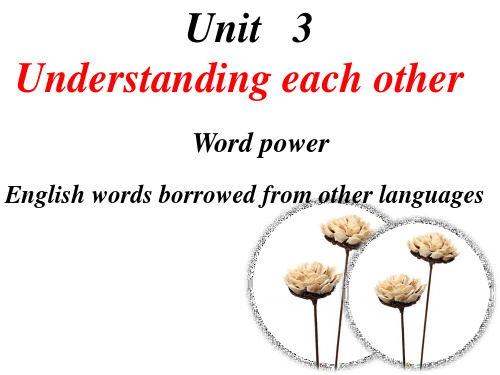
Unreal conditionals
Unreal conditionals
虚拟条件句 的注意事项 3. should/were/had 可提到虚拟条件句的句首, if 不需要。 Should you make a mistake, you should not be embarrassed. Were you to take the train, you would get there much sooner. Had you told me earlier, I would not have got into trouble. 4. 虚拟条件句中,if 条件句中可以用“ could have done”. If I could have told you about cultural differences between Italy and the UK, I would have.
Exercise
My grandpa’s ifs
had been 1. If he ________ rich, he would have travelled a lot. got 2. Had ______ he _______ into a university, he would have studied medicine. Had he ________ had 3. _____ a chance to go abroad, he would have taken it. If had had a chance to go abroad, he 3. _____ he ________ would have taken it. have been as happy as he is now if he 4. Would _____ he ________ had had more education when he was growing up ?nals
牛津英语模块6 Grammar and usage

不定式用在介词but, except, besides 后时如果前面有do的各种形式,介词 后的不定式不带to,相反则带to。 (1)She could do nothing but______. cry (2)I have no choice but _______. to go
Be careful!
某些特殊动词后面既可以接doing, 又 可以接to do: love, like, hate, prefer, dislike, begin, continue, intend, attempt, propose, want, need, remember, forget, regret, try, deserve, start + to do/doing.
单个不定式作主语时,谓语动词用__ 单 数; 形式主语 若不定式太长,往往用it作_________, 不定式置后。
Be careful!
(2)动名词作主语 Fighting broke out between the South and the North. It is / was +(no) adj. +doing sth. It is no useful / good doing sth.
2.动名词作宾补
V + sb. + doing sth.
doing表示动作正在进行或持续。
lying on bed, crying, when I I saw Mary______ ran into the classroom.
3.过去分词作宾补
V + sb. / sth.+ done sth.
他总是第一个来最后一个走。 He is always the first________ to come and the last _________. to leave
牛津高中英语模块6 Unit1 Grammar2 06 Grammar and usage
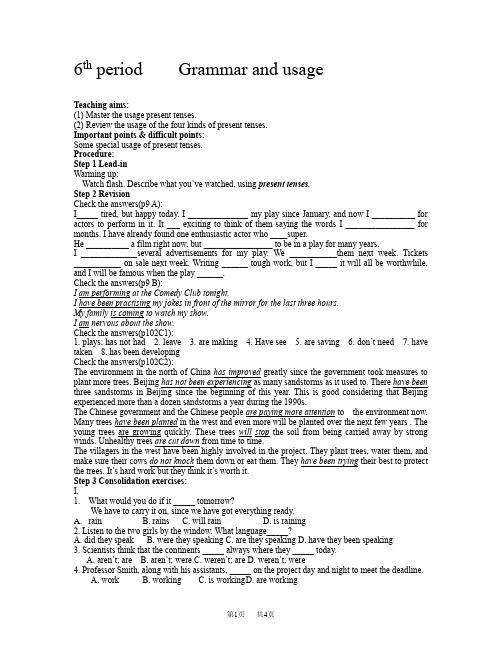
6th period Grammar and usageTeaching aims:(1) Master the usage present tenses.(2) Review the usage of the four kinds of present tenses.Important points & difficult points:Some special usage of present tenses.Procedure:Step 1 Lead-inWarming up:Watch flash. Describe what you’ve watched, using present tenses.Step 2 RevisionCheck the answers(p9 A):I_____ tired, but happy today. I ______________ my play since January, and now I __________ for actors to perform in it. It ___ exciting to think of them saying the words I ________________ for months. I have already found one enthusiastic actor who ____super.He __________ a film right now, but ________________ to be in a play for many years.I _____________several advertisements for my play. We ___________them next week. Tickets ___________ on sale next week. Writing ______ tough work, but I _____ it will all be worthwhile, and I will be famous when the play ______.Check the answers(p9 B):I am performing at the Comedy Club tonight.I have been practising my jokes in front of the mirror for the last three hours.My family is coming to watch my show.I am nervous about the show.Check the answers(p102C1):1. plays; has not had2. leave3. are making4. Have see5. are saving6. don’t need7. have taken8. has been developingCheck the answers(p102C2):The environment in the north of China has improved greatly since the government took measures to plant more trees. Beijing has not been experiencing as many sandstorms as it used to. There have been three sandstorms in Beijing since the beginning of this year. This is good considering that Beijing experienced more than a dozen sandstorms a year during the 1990s.The Chinese government and the Chinese people are paying more attention to the environment now. Many trees have been planted in the west and even more will be planted over the next few years . The young trees are growing quickly. These trees will stop the soil from being carried away by strong winds. Unhealthy trees are cut down from time to time.The villagers in the west have been highly involved in the project. They plant trees, water them, and make sure their cows do not knock them down or eat them. They have been trying their best to protect the trees. It’s hard work but they think it’s worth it.Step 3 Consolidation exercises:I.1.---What would you do if it _____ tomorrow?---We have to carry it on, since we have got everything ready.A.rainB. rainsC. will rainD. is raining2. Listen to the two girls by the window. What language_____?A. did they speakB. were they speakingC. are they speakingD. have they been speaking3. Scientists think that the continents _____ always where they _____ today.A. aren’t; areB. aren’t; wereC. weren’t; areD. weren’t; were4. Professor Smith, along with his assistants, _____ on the project day and night to meet the deadline.A. workB. workingC. is workingD. are working5.They have a good knowledge of English but little _____ they know about German.A. haveB. didC. hadD. do6. ---What are you going to do this afternoon?---I’m going to the cinema with some friends. The film_____ quite early, so we_____ to the bookstore after that.A. finished; are goingB. finished; goC. finishes; are goingD. finishes; go7. Millions of pounds’ worth of damage _____ by a storm which swept across the north of England last night.A. has been damagedB. had been damagedC. will be causedD. will have been caused8. He was hoping to go abroad but his parents _____ that they won’t support him unless he can borrow money from the bank.A.were decidingB. have decidedC. decidedD. will decide9. Since I won the big prize, my telephone hasn’t stopped ringing. People _____ to ask how I am going to spend the money.A. phoneB. will phoneC. were phoningD. are phoning10. Nowadays, a large number of women, especially those from the countryside, _____ in the clothing industry.A. is workingB. worksC. workD. worked11. Months ago, we sailed ten thousand miles across this open sea, which _____ the Pacific, and we met no storms.A. was calledB. is calledC. had been calledD. has been called12. With more forests being destroyed, huge quantities of good earth _____ each year.A. is washing awayB. is being washed awayC. are washing awayD. are being washed away13. The country life he was used to _____ greatly since 1992.A. changeB. has changedC. changingD. have changed14. ---Are you still busy?---Yes, I _____ my work, and it won’t take long.A. just finishB. am just finishingC. have just finishedD. am just going to finish15. They ____on the program for almost one week before I joined them, and now we ______ on it as no good results have come out so far.A. had been working; are still workingB. had worked; were still workingC. have been working; have workedD. Have worked; are still working16. Years ago we didn’t know this, but recent science_____ that people who don’t sleep well soon get ill.A. showedB. has shownC. will showD. is showingII.1. The house belongs to my aunt but she_____ here any more.A. hasn’t livedB. didn’t liveC. hadn’t livedD. doesn’t live2. As you can see, the number of cars on our roads _____ rising these days.A. was keepingB. keepC. keepsD. were keeping3.--- _____ leave at the end of this month.---I don’t think you should do that until _____ another job.A. I’m going to; you’d foundB. I’m going to; you’ve foundC. I’ll; you’ll findD. I’ll; you’d find4. ---Where did you put the car keys?---Oh, I _____ I put them on the chair because the phone rang as I ____ in.A.remembered; comeB. remembered; was comingC. remember; comeD. remember; was coming5. I have to go to work by taxi because my car_____ at the garage.A. will be repairedB. is repairedC. is being repairedD. has been repaired6. Customers are asked to make sure that they _____ the right change before leaving the shop.A. will giveB. have been givenC. have givenD. will be given7. ---I was wondering if we could go skiing on the weekend.---_____.A. SoundB. SoundedC. SoundingD. Sounds8. I won’t tell the student the answer to the math problem until he_____ owes a lot of money to the bank.A. has been workingB. will have workedC. will have been workingD. had worked9. The father as well as his three children _____ skating on the frozen river every Sunday afternoon in winter.A. is goingB. goC. goesD. are going10. Ladies and gentlemen, please fasten your seat belts. The plane _____.A. takes offB. is taking offC. has taken offD. took off11. Although the causes of cancer_____, we do not yet have any practical way to prevent.A. are being uncoveredB. have been uncoveringC. are uncoveringD. have uncovered12. Police are now searching for a woman who is reported to _____ since the flood hit the area last Friday.A. have been missingB. have got lostC. be missingD. get lost13. This machine_____. It hasn’t worked for years.A. didn’t workB. wasn’t workingC. doesn’t workD. isn’t working14. My friend, who_____ on the International Olympic Committee all his life, is retiring next month.A. servedB. is servingC. had servedD. has served15. Look at the timetable. Hurry up! Flight 4026_____ off at 18:20.A. takesB. tookC. will be takenD. has taken16. At the foot of the mountain _____.A. a village lieB. lies a villageC. does a villageD. lying a village17. Most of what has been said about the Smiths_____ also true of the Johnsons.A. areB. isC. beingD. to be18. The construction of the two new railway lines_____ by now.A. has been completedB. have been completedC. has completedD. have completed19. ---I don’t suppose the police know who did it.---Well, surprisingly they do. A man has been arrested and now_____.A. has been questionedB. is being questionedC. is questioningD. has questioned20. Although medical science _____ control over several dangerous disease, what worries us is that some of them are returning.A. achievedB. has achievedC. will achieveD. had achieved21. A poet and artist_____ coming to speak to us about Chinese literature and painting tomorrow afternoon.A. isB. areC. wasD. were22. Send my regards to your lovely wife when you_____ home.A. wroteB. will writeC. have writtenD. writeFill in the blanks:We have just moved into a new house and I ________________hard all morning. I ______________to get my new room in order. This ___________ easy because I _____ over a thousand books. To make matters worse, the room is rather small, so I __________________ my books on the floor.At the moment, they ______every inch of floor space and I actually ______ walk on them to get in or out of the room. A short while ago, my sister ______me to carry one of my old bookcases up the stairs. She _____ into my room and got a big surprise when she saw all those books on the floor.'This is the prettiest carpet I _____________,' she said. She gazed at it for some time then added, 'You _______________bookcases at all. You can sit here in your spare time and read the carpet!'Step 4HomeworkFinish relevant exercises on page 92-93 in Grammar book.。
Book6_U4_教案课时4Grammarandusage1
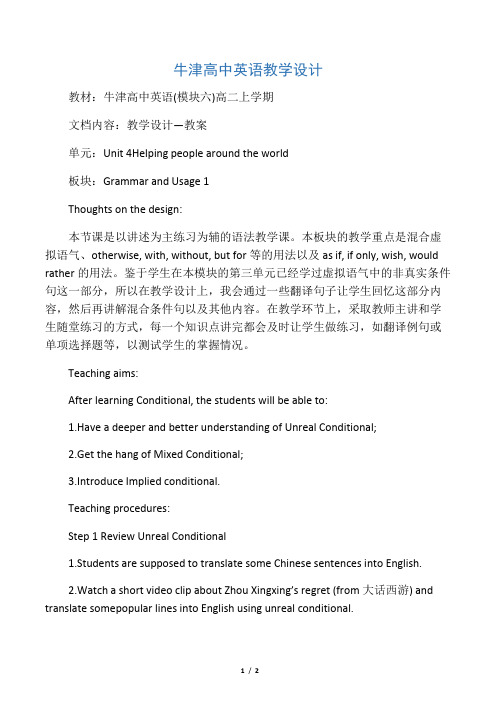
牛津高中英语教学设计教材:牛津高中英语(模块六)高二上学期文档内容:教学设计—教案单元:Unit 4Helping people around the world板块:Grammar and Usage 1Thoughts on the design:本节课是以讲述为主练习为辅的语法教学课。
本板块的教学重点是混合虚拟语气、otherwise, with, without, but for等的用法以及as if, if only, wish, would rather的用法。
鉴于学生在本模块的第三单元已经学过虚拟语气中的非真实条件句这一部分,所以在教学设计上,我会通过一些翻译句子让学生回忆这部分内容,然后再讲解混合条件句以及其他内容。
在教学环节上,采取教师主讲和学生随堂练习的方式,每一个知识点讲完都会及时让学生做练习,如翻译例句或单项选择题等,以测试学生的掌握情况。
Teaching aims:After learning Conditional, the students will be able to:1.Have a deeper and better understanding of Unreal Conditional;2.Get the hang of Mixed Conditional;3.Introduce Implied conditional.Teaching procedures:Step 1 Review Unreal Conditional1.Students are supposed to translate some Chinese sentences into English.2.Watch a short video clip about Zhou Xingxing’s regret (from大话西游) and translate somepopular lines into English using unreal conditional.Step 2 Introduce“even if”“as if”“if only”to studentsStep 3 Analysis of Mixed Conditional1. The Definition of Mixed Conditional2. Mixed Conditional Patterns[Explanation]混合条件句的学习必须建立在掌握真实条件句和非真实条件句的基础上,在详细了解了非真实条件句的构成和动词形式后,混合条件句的构成也就比较容易理解了。
牛津译林版高中英语模块6:Grammar and usage (4)

Compare the sentences and find out the differences between “v. -ed” and “v. -ing” as attributives.
1. The case belonging to Tom looks very strange.
2. The box wrapped in colored paper looks strange.
Practice:
The building ___to__b_e__b_u__il_t___(build)
next year will be a new school.
The building __b_e_i_n_g__b_u_i_lt________
(build) now will be a new school.
computer game.
5. The library _b_e_i_n_g__b_u_i_lt_(build) now will be
completed next month.
The infinitive is often used as the subject of a sentence. When we talk about a general idea, we sometimes use verb-ing as the subject.
3. The movie to be issued next month is said to be very interesting.
4. The book published last month is an interesting one.
When we use non-finite as attributives: v-ed—passive meaning / complete action v-ing—active meaning/ continuous action to do—action that will happen in the future
译林牛津模块6 unit 1 全单元简案5th period Grammar and usage (

译林牛津模块6 unit 1 全单元简案5th period Grammar and usage (译林牛津版高二英语选修六教案教学设计)南京九中张茹芳Teaching aims:(1) Master the usage of present tenses.(2) Practice about the four kinds of present tenses.Important points difficult points: the simple present tense; the present continuous tense; the present perfect tense; the present perfect continuous tense:Procedure:Step 1 Lead-inWarming up:1. What do you often do in your vacation?2. Do you like travel?3. Have you ever traveled abroad?4. Which of the following tourist attractions is your first choice if given a chance?(Pictures)I have been to the Moon Lake. It is in the west of China.I went there last August. If you go there, the Moon Lake will find you happy and excited. However, the Moon Lake is becoming smaller and smaller. I’m sure the government will take measures to protect it. In fact, many people have been working on it.In which city can you see the Statue of Liberty?A. Los Angles.B. New York.C. WashingtonD.C.The Statue of Liberty was given to America by France. It is said planes are flying around to protect it. It is a symbol of Freedom. It has been there for more than 200 years. My cousin has been expecting a chance to go there.Free talk:Describe what you are watching, using present tenses.Step 2 General knowledge of present tensesthe simple present tense:I am at a comedy show. The sun rises in the west.The Academy Awards show is on television every year.Every time a prop comedian tells a joke, he or she uses a thing, called a prop.1. My mother loves classical music.2. My father visits his parents once a week.3. When I was very young, my granny told me the earth is round and most rivers flow into seas and oceans.4. Now I major in geography.Further study:Smith passes to Darvency, Davency to Barnes, Barnes to Lucas---and Harriet intercepts…Harriet to Simons, niceball---and Smith shoots.First I put some butter into a frying pan and light the gas; then, while the butter is melting, I break three eggs into the bowl, like this.In the film Gold Rush, Chaplin and his friends are trapped in the snowstorm. He enjoys every mouthful of the leather shoe as if it is the most delicious meal he has ever had.---How do I get to the station? ---You go straight to the traffic lights, then turn right.Make sure everyone is given a chance to sing on the stage.Bank Robbery: Robbers take $ 100,000.Focus on:The exhibition ______on May 1st and ______ at the end of June. (open; close)The plane _________at 11:30 and ________ in Shanghai at 1:20.(take off; arrive)______there a film on tonight? (be)I’ll give her the notebook____________. Tellme_________________________.He will keep the work ______________ ________.She is out of danger now. How are you today?They are busy at the moment. They normally get up at six.Generally he watches TV for two hours in the evening.They pay me weekly.Translation:我叔叔从不来看我们。
高二英语 模块六 M6U2Grammar and usage课件 牛津版

不定式的基本用法
A 1. I don’t want _____ like I’m speaking ill of anybody, but the manager’s plan is unfair. A. to sound B. to be sounded C. sounding D. to have sounded Note: 不定式可在句中作动词宾语,常接不定式作宾语 的动词有 agree, ask, attempt, care, dare, decide, desire, determine, expect, fail, happen, hesitate, hope, intend, manage, offer, plan, prepare, promise, pretend, remain, refuse, want, wish 等
4. a. I’m going to the supermarket this afternoon. Do you have anything _____ . B A. to be buying B. to buy C. for buying D. bought D b. There are five pairs _____, but I’m at a loss which to buy. A. to be chosen B. for choosing C. to choose D. to choose from Note: 作定语的不定式如果是不及物动词,且不定式所修饰 的词是不定式动作的承受者,不定式后须有相应的介词。
6 (09天津, 4) ______ the project in time, the D staff were working at weekends. A Completing B Having completing C To have completed D To complete 7 (09湖南, 29) Nowadays people sometimes separated their wasted to make it easier for it D ______. A reusing B reused C reuses D to be reused
Book 6_U3_Grammar and usage

牛津高中英语教学设计教材:牛津高中英语(模块六)高二上学期文档内容:教学设计—教案单元:Unit 3 Understanding each other板块:Grammar and Usage作者:丁荷花Thoughts on the design:本节课是一节语法教学课。
根据中学语法教学的目的,语法教学应在语篇中进行语法教学;在创设情景中进行语法教学;在完成任务中进行语法教学。
这节课的主要目标是达到学习虚拟语气一般条件句的三种时态的不同结构以及一般条件句的倒装结构。
通过文字、表格和练习对虚拟语气讲解,使得复杂的语法通俗明了,浅显易懂;再利用设计好的语言情景,加以运用和巩固,以笔头、口头等多种形式将语法练习有机地、灵活地融会于各种课堂任务之中。
通过对比归纳,有助于学生从整体上进行掌握,帮助学生将语法知识加以巩固和“内化”,以培养学生自主学习与探究的能力,提高准确使用语言的能力。
Teaching aims:After learning this part, the students will be able to:1. use unreal conditionals of the present, past or future time;2. improve reading abilities and the ability of using unreal conditionals;3. master some useful language points.Teaching procedures:Step 1 Lead-in1. Translate the following sentences on the blackboard.如果我是一只小鸟,我就能飞了。
If I were a bird, I could fly.Is it possible for you to be a bird?The situations are not real or are imaginary. We call them unreal conditionals. Unreal conditionals state a condition or situation that is not real or is imaginary.2. Find out the unreal conditional sentences mentioned in the reading part.If you had joined the chat room ten minutes ago, you would have known what we were talking about.If I got married in the UK, I would expect a present.If I got married in Italy, I would have to give a present.Should you come to Brunei, you would have to take off your shoes before going into someone’s house.[Explanation]为了使枯燥的语法课变得生动有趣,所以在导入部分用了一句浅显易懂的句子导入新课,让学生知道什么是虚拟语气,然后通过复习的方式将阅读课中出现的虚拟语气句一一找出,对虚拟语气有进一步的了解。
牛津 模块6 Unit1 Grammer and usage 非谓语动词 (共17张PPT)
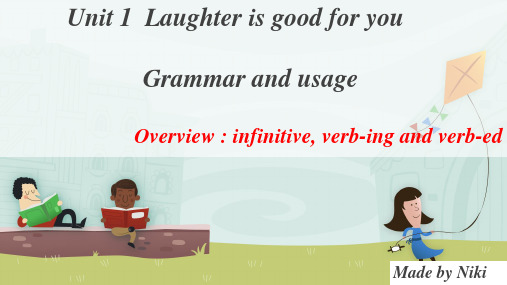
e.g. To see is to believe. Laughing helps your body stay healthy and can even help you fight pain.
Overview
2. Non-finite verbs can be used as the attributive. * We use being + verb-ed to form the continuous passive. 进行时态的被动语态
e.g. The underground system being built in the city will be open next year.
yesterday’s China Daily. 5. So far nobody has claimed the money _di_s_co_v_e_re_d_____(discover) in the library. 6. A great number of students q_u_e_st_io_n_e_d_____(question) said they were forced to
Brainstorming
非谓语动词
infinitive verb-ing verb-ed
Exercise
1. I would like _to__th_a_n__k_(thank) you for your invitation. 2. I am so glad that I have persuade you _to__a_p_o_lo_g_i_z_e(apologize) to her. 3. Isn’t is wonderful _t_o_h__a_ve___(have) good friends. 4. I decide to write rather than ___p_h_o_n_e___(phone)
牛津译林 模块6Unit 2 Grammar and usage

A. selecting
B. to select
C. selected
D. having selected
3、Do you wake up every morning new day?
A. feel
B. to feel
C. feeling
D. felt
energetic and ready to start a
温馨提示
1.熟记不定式、ing 形式与谓语动词的 固定搭配。
2.掌握非谓语动词在句中的基本用法。 3.学会在具体语境中正确判断和运用
非谓语动词。
方法点津
1.动词不定式作主语,一般使用 it 做形式主语。 句型:It ’s +adj.+ for sb + to do It ’s +adj.+ to do
式
动
名 主语 宾语 表语
定语
词
分
表语 宾补 定语 状语
词
用法归纳
1. 动词不定式作主语,一般使用 it 做形式主语。 2. 动词 ing 形式做主语。 3. 动词不定式作宾语。 4. 动词 ing 形式做宾语。 5. 动词不定式做宾语补足语。
用法归纳
1. 疑问词 + 动词不定式。 2. 使役动词 make 后跟不定式做宾补。 3. 在固定词组中使用动词 ing 形式。
3.感官动词如see, hear等词后跟省去 to 的不定 式,也可跟动词 ing形式做宾语补足语,但意 义有所不同。 句式: see sb do sth /see sb doing sth
hear sb do sth /hear sb doing sth
要点补充:
4. 动词 ask, tell 后跟动词不定式做宾语补足语。 句式:ask/tell sb to do sth.
- 1、下载文档前请自行甄别文档内容的完整性,平台不提供额外的编辑、内容补充、找答案等附加服务。
- 2、"仅部分预览"的文档,不可在线预览部分如存在完整性等问题,可反馈申请退款(可完整预览的文档不适用该条件!)。
- 3、如文档侵犯您的权益,请联系客服反馈,我们会尽快为您处理(人工客服工作时间:9:00-18:30)。
现在分词
• • • • 作定语 作表语 作宾语补足语 作状语
• 作定语:现在分词作定语,当分词单独做定语 时,放在所修饰的名词前;如果是分词短语做 定语放在名词后。 • In the following years he worked even harder. • 在后来的几年中,他学习更努力了。 • The man speaking to the teacher is our monitor's father.
• 如果不定式修饰time, place, way,可以省略 介词: • He has no place to live. • 他无处安身。
• 如果不定式所修饰名词是不定式动作承受者, 不定式可用主动式也可用被动式: • Have you got anything to send? • 你要送什么东西吗? • Have you got anything to be sent? • 你有什么东西需要送吗?
• 表结果(往往是与预期愿望相反的结果 意料之外): 常放在never only后.
• He arrived late only to find the train had gone. • 他来晚了,只见火车已经走了。
• 表原因:常放在形容词后面
• They were very sad to hear the news. • 他们听到这条新闻非常伤心。
• 有些动词如make, let, see, watch, hear, feel, have等与不带有to的不定式连用, 但改为被动语态时,不定式要加to。 • I saw him cross the road. • 我看见他横过公路。 • He was seen to cross the road. • 他被我看见横过公路。
• 如果不定式(宾语)后面有宾语补足语, 则用it作形式宾语,真正的宾语(不定 式)后置,放在宾语补足语后面
• Marx found it important to study the situation in Russia. • 马克思发现研究俄国的情况是很重要的。
• • • • 动词不定式也可充当介词宾语 I have no choice but to stay here. 我只能留在这里,别无选择。 He did nothing last Sunday but repair his bike. • 他上周日除了修他的自行车什么也没干。
• 现在分词的被动语态:一般式表示与谓语动词 同时发生的被动的动作,完成式表示发生在谓 语动词之前的被动的动作。 • • The problem being discussed is very important. • 正在被讨论的问题很重要。 • Having been told many times, the naughty boy made the same mistake. • 被告诉了好几遍,这个淘气的孩子又犯了同一 个错误。
• 表目的
• He worked day and night to get the money. • 他夜以继日地工作来赚钱。 • 注意不定式放句首时,逻辑主语与句子主语要一 致:(作目的状语:既可以放在句首,也可以放 在句尾 )
• To learn English well, a dictionary is needed. (错) • To learn English well, he needs a dictionary. (对) • 为了学好英语,他需要一本词典。
• 动词不定式前有时可与疑问词连用 • He gave us some advice on how to learn English. • 他给了我们一些学英语的建议。
不定式作宾语补足语
• 在复合宾语中,动词不定式可充当宾语 补足语,如下动词常跟这种复合宾语: want, wish, ask, tell, order, beg, permit, help, advise, persuade, allow, prepare, cause, force, call on, w• • • To see is to believe 眼见为实 Her job is to clean the hall. 她的工作是打扫大厅。 He appears to have caught a cold. 他 似乎感冒了。
不定式作定语
• 动词不定式作定语,放在所修饰的名词或代词 后。与所修饰名词有如下关系:
分词
• 现在分词 verb-ing • 现在分词既具有动词的一些特征,又具有形容 词和副词的句法功能。
• 过去分词 verb-ed • 过去分词只有一种形式:规则动词由动词原形 加词尾-ed构成。不规则动词的过去分词没有 统一的规则要求,要一一记住。
现在分词
• 现在分词的主动语态:现在分词主动语态的一 般式表示与谓语动词所表示的动作同时发生, 完成式表示的动作在谓语动词所表示的动作之 前发生,常作状语。 • They went to the park, singing and talking. • 他们边唱边说向公园走去。 • Having done his homework, he played basketball. 做完作业,他开始打篮球。
• 常用句式有: • 1、It takes sb.+some time+ to do。 • 2、It+be+形容词+of sb +to do。
• 常用 careless,clever,good,foolish,honest,kind,laz y,nice,right,silly,stupid,wise,等表示赞扬或批 评的形容词,不定式前的sb.可作其逻辑主语。
• 以下动词及短语只跟动名词作宾语: • enjoy, finish, suggest, avoid(避免), excuse ,delay, imagine, keep, miss, consider, admit(承认),deny(否认), mind, permit, forbid, practise, risk(冒险), appreciate(感激), be busy, be worth, feel like, can't stand, can't help(情不自禁 地), think of, dream of, be fond of, prevent…(from),keep …from, stop… (from),protect…from, set about, be engaged in, spend…(in), succeed in, be used to, look forward to, object to, pay attention to, insist on, feel like
动词-ed
表示被动的动作
非谓语动词在句子中的作用
不定式 infinitive
• • • • • • 作主语 作宾语 作宾语补足语 作表语 作定语 作状语
不定式作主语
• To see is to believe 眼见为实 • To finish the work in ten minutes is very hard. • 十分钟之内完成这项工作是很难的。 • 动词不定式短语作主语时,常用it作形 式主语,真正的主语不定式置于句后。 • It is very hard to finish the work in ten minutes. • 十分钟之内完成这项工作是很难的。
• 2,说明所修饰名词的内容
• We have made a plan to finish the work. • 我们制定了一个完成工作的计划。
• 3,被修饰名词是不定式逻辑主语
• He is the first to get here. • 他第一个来到这儿。
不定式作状语
• • • • 表目的 表结果 表原因 表程度
• 1,动宾关系 • 2,说明所修饰名词的内容 • 3,被修饰名词是不定式逻辑主语
1,动宾关系
• I have a meeting to attend. • 我有一个会议要出席。 • • PS:注意:不定式为不及物动词时,所修饰 的名词如果是地点、工具等,应有必要的介词 • He found a good house to live in. • 他找到了一个居住的好房子。 • The child has nothing to worry about. • 这个孩子无忧无虑
非谓语动词 non-finite verbs
• 非谓语动词是指在句子中不是谓语的动 词,主要包括不定式、动名词和分词 (现在分词和过去分词),即动词的非 谓语形式。非谓语动词除了不能独立作 谓语外,可以承担句子的任何成分。
非谓语动词的三种形式
动词不定式 动词-ing
表示未发生的或后发生的动作 表示主动的动作
• 表程度
• It‘s too dark for us to see anything. 太暗了, 我们什么也看不见。 • The question is simple for him to answer. • 这问题由他来回答是很简单的。
动名词 V-ing
• 动名词既具有动词的一些特征,又具有 名词的句法功能
• 3、It+be+形容词+for sb+ to do.
不定式作宾语
• 常与不定式做宾语连用的动词有:want, hope, wish, offer, fail, plan, learn, pretend, refuse, manage, help, agree, promise, prefer.
• 一般式 doing • 完成式 having done being done having been done
动名词
• • • • • 作主语 作表语 作宾语 作定语 作同位语
